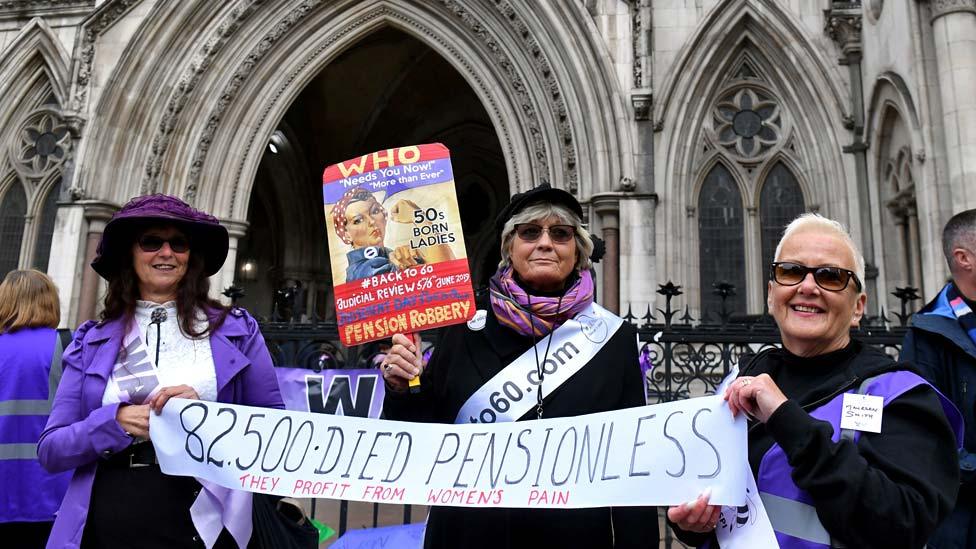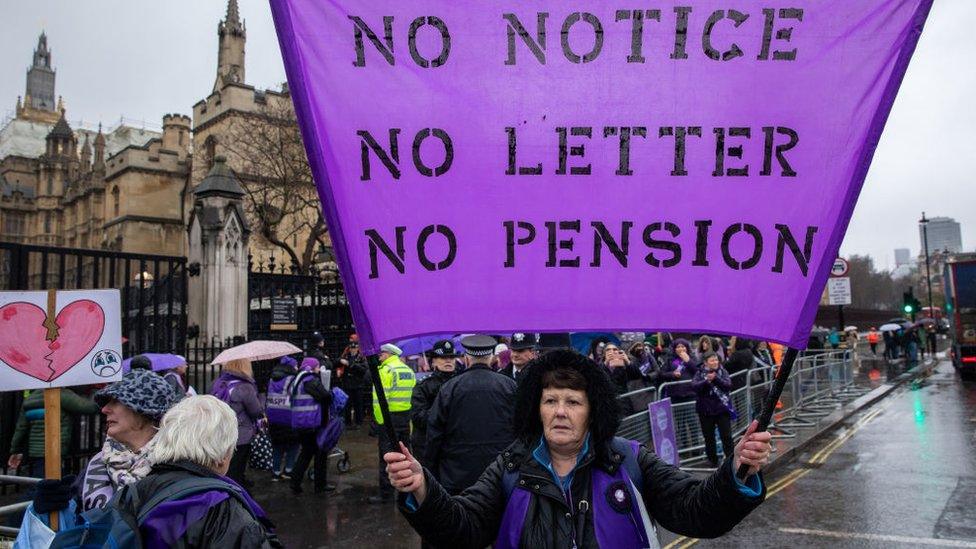Women lose state pension age appeal against government
- Published

Campaigners outside court during a previous hearing
Two women affected by the state pension age being changed from 60 to 66 for women have lost their appeal against a High Court ruling.
Campaigners claim women born in the 1950s have been treated unfairly by rapid changes to their pension age, due to reach 66 later this year.
On Tuesday, senior judges unanimously dismissed the women's appeal.
They say introducing the same state pension age for men and women did not amount to unlawful discrimination.
The government welcomed the ruling, saying the changes were a "long-overdue move towards gender equality".
Julie Delve, 62, and Karen Glynn, 63, backed by campaign group BackTo60, were challenging the pension age changes after losing a High Court fight against the Department for Work and Pensions last year.
The campaign groups associated with the court case represent almost four million women who were affected by the government decision to increase the state pension age from 60 to 66.
Many on lower incomes say they are facing financial hardship as a result.
Campaigners, however, say their fight is not over.
Joanne Welch, founder and director of BackTo60, told the BBC she would now consider taking the case to the Supreme Court and would also draft legislation to bring a women's Bill of Rights.
Unison, the UK's largest trade union, said raising the state pension age with "next to no notice" has had a calamitous effect on the retirement plans of a generation of women.
It called on MPs to intervene to help those women who were now struggling to make ends meet.

'I lost my home'

Pamela Satchwell had to carry on working post 60 after the pension age rules changed.
She did 16 hours a week as a carer for disabled children and people with ADHD.
But without a pension contribution to support her earnings, it was not enough. Pam's husband then died.
She subsequently lost her house because she could not afford her mortgage alone and she had to sell all of the jewellery her husband had given her.
Now that she is 67, she is finally receiving her pension and she manages better financially.
"But it's too late now. I lost my home, I have none of the trinkets my husband gave me. I lost the life I had and I am never going to get it back," says Pam.
As for the women involved in the court case, Pam wishes people understood it is not so easy for that those who found out they could not retire.
"You can not just run out and find a job when you are in your 60s. Employers don't want people that age, " she says.

'Paid less than men'
Julie Delve and Karen Glynn were in court last June when they told a judicial review that when they had not received their state pension at the age of 60, their lives had been affected disproportionately.
They argued the way the government had introduced the increase of the pension age was discriminatory. Some women thought they would retire at 60 but found they had to wait up to more than five years, leading to financial hardship.
Campaigners say the workplace was less equal for many of this generation who were taking time out of their careers to raise children, were paid less than men and could not save as much in occupational pensions, so the change has hit them harder.
The senior justices said: "Despite the sympathy that we, like the members of the Divisional Court [High Court], feel for the appellants and other women in their position, we are satisfied that this is not a case where the court can interfere with the decisions taken through the parliamentary process."
They said that "in the light of the extensive evidence" put forward by the government, they agreed with the High Court's assessment that "it is impossible to say that the government's decision to strike the balance where it did - between the need to put state pension provision on a sustainable footing and the recognition of the hardship that could result for those affected by the changes - was manifestly without reasonable foundation".

End of the road?

This issue led to a huge campaign, not always led by the same groups, which has garnered widespread support for women who believe their pensions were stolen from them.
A different result in the general election could have changed the picture. Labour had promised to compensate those affected.
That avenue was closed for campaigners. Now, the BackTo60 group has lost another major court battle.
Driven supporters may not be willing to give up, and will hope to take it to the next stage legally.
But with each defeat, their chances of actually seeing a greater pension become slimmer.

Mental health impact
Unison assistant general secretary Christina McAnea said: "For a generation of women, this is nothing short of a disaster.
"Those on lower incomes have been left in dire straits, struggling to make ends meet with precious little support from the government."
Yvette Greenway Mansfield, chief executive of the charity, SOS the Silence of Suicide and the partner of the QC who argued the case in court, underlined the mental health impact the government's decision had had.
She cited a recent survey by her charity which garnered 20,000 responses about the pensions age change.
"People have been having thoughts of suicide, they are self harming," said Ms Mansfield. "This is the unseen impact. This is not discussed anywhere near enough and I am hugely concerned for women."
A spokesperson for the Department for Work and Pensions said they were pleased the court "decided that due notice" had been given to women.
They added: "The government decided 25 years ago that it was going to make the state pension age the same for men and women as a long-overdue move towards gender equality.
"Raising state pension age in line with life expectancy changes has been the policy of successive administrations over many years."
- Published18 December 2024
